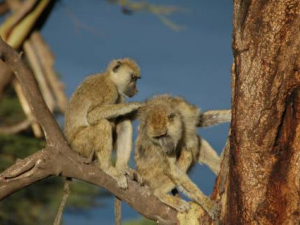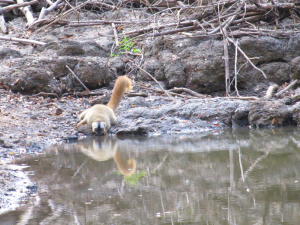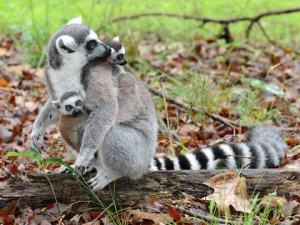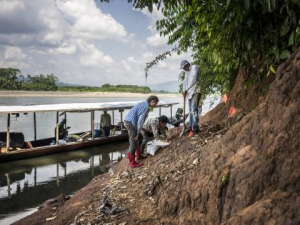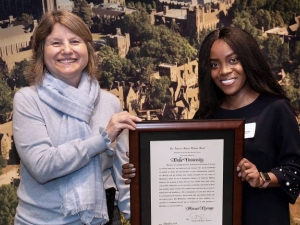When COVID hit last spring, many graduate students had to give up their summer plans for teaching, field research and internships. The Provost’s Office quickly pledged support, and Vice Provost Ed Balleisen spearheaded the effort to identify virtual opportunities. Experiential fellowships with eight host organizations and research assistantships with more than 20 Duke units provided summer funding and career development for all 59 Ph.D. students in need. Every student who responded to Duke’s end-of-summer evaluation would… read more about Duke Ph.D. Students Find Unexpected Benefits in an Unusual Summer »
Brian Hare, professor of Evolutionary Anthropology, and Vanessa Woods, a research scientist in the same department, are interviewed about their book Survival of the Friendliest in this video by National Geographic. read more about Why It Actually Might Be 'Survival of the Friendliest' »
DURHAM, N.C. -- Close bonds with the opposite sex can have non-romantic benefits. And not just for people, but for our primate cousins, too. Drawing on 35 years of data, a new study of more than 540 baboons in Amboseli National Park in Kenya finds that male baboons that have close female friends have higher rates of survival than those who don’t. Researchers have often assumed that when a male is friendlier to certain females, it’s for the reproductive perks: to better protect his offspring, or to boost his chances of… read more about Male Baboons With Female Friends Live Longer »
DURHAM , N.C. -- Many humans live to see their 70s and 80s, some even reach 100 years old. But life is much shorter for our closest animal relatives. Chimpanzees, for example, rarely make it past age 50, despite sharing almost 99% of our genetic code. While advances in medicine and nutrition in the last 200 years have added years to human lifespans, a new study suggests there could be a more ancient explanation why humans are the long-lived primate. Part of the secret to human longevity, researchers say, may lie… read more about Your Cells Look Young for Their Age, Compared to a Chimp’s »
Brian Hare, professor of Evolutionary Anthropology, and Vanessa Woods, a research scientist in the same department, joined Alan Alda's radio show Clear+Vivid to discuss what their research tells us about humanity's essential ingredient. Listen at the Clear+Vivid website. read more about On Humanity’s Essential Ingredient »
Research by Brian Hare, professor of Evolutionary Anthropology, is discussed in a Washington Post article about training service dogs. Read the article at the Washington Post. read more about Which Pups Will Make the Grade as a Service Dog? »
Professor Brian Hare and research scientist Vanessa Woods, both from the Department of Evolutionary Anthropology, joined WUNC to explain how "survival of the fittest" may not just favor size and strength. Listen at WUNC. read more about Natural Selection Favors The Friendly, According To Duke Scientists »
COVID-19 is bringing new scientific, behavioral and cultural challenges every day. The DIBS Faculty Network consists of 200 interdisciplinary neuroscience researchers from across Duke’s Schools of Medicine, Nursing, and Law; Pratt School of Engineering, Fuqua School of Business, and Trinity College of Arts & Sciences. Their research can help us understand how the COVID-19 pandemic is influencing people’s decision-making, behavior, choices, and physical and mental health. The following faculty interviews… read more about COVID-19: A Neuroscience Perspective »
Fifteen Duke Ph.D. students have received prestigious awards from the National Science Foundation’s Graduate Research Fellowship Program (NSF GRFP) for 2020. Launched in 1952, the GRFP is the oldest graduate fellowship of its kind. It supports outstanding graduate students in NSF-supported science, technology, engineering, and mathematics disciplines who are pursuing Ph.D. or research-based master’s degrees. Fellows receive a three-year stipend, coverage of tuition and fees, and opportunities for international research and… read more about 15 Ph.D. Students Receive Prestigious NSF Fellowships »
Congratulations to the following student award winners from Duke University units in 2020. African & African American Studies John Hope Franklin Award for Academic Excellence: Elizabeth DuBard Grantland Karla FC Holloway Award for University Service: Beza Gebremariam Mary McLeod Bethune Writing Award: Jenna Clayborn Walter C. Burford Award for Community Service: Kayla Lynn Corredera-Wells Art, Art History & Visual Studies… read more about Student Honors and Laurels for 2020 »
It’s 1 PM and you’re only halfway through a 6-hour hike, climbing in steep terrain under a 100° cloudless sky. Your water bottle is nearly empty, and you’ve heard the worst of this hike is yet to come. And then, just as you are making peace with the fact that you may collapse from dehydration at any second, you approach a small river. The germaphobe side of your brain is shouting for you not to drink from that. The dehydrated animal in you, however, is seriously considering it. What do you do? That is the question that Dr.… read more about For Lemurs, Water Holes Are a Matter of Taste »
Humans have conquered smallpox and drastically reduced child mortality rates, yet we now face problems never seen before. Conditions like heart disease, obesity, cancer, and diabetes pose serious threats to our health. How can we overcome them? The answer may lie in our past. Herman Pontzer, an associate professor of evolutionary anthropology at Duke, thinks we have something to learn by looking at hunter gatherers For most of human evolution, we had to work for our food. Recent developments like supermarkets and cities are… read more about Paleo Fact and Fiction: the Key to Being Healthy »
Duke University alumnus Noor Tasnim has been named one of 18 Luce scholars for 2020-2021. The Luce award provides stipends for living and professional placement in Asia. Tasnim graduated from Duke in 2018 with distinction in evolutionary anthropology and in global health. He researches lower limb biomechanics, musculoskeletal injuries and performance. His research interest came about after he joined Street Medicine Urban Dance Team at Duke and began to study barefoot locomotion and lower limb injuries. His… read more about Duke Alumnus Wins Luce Scholarship for Research in Asia »
Even kids who are nearly grown still need a parental figure to help them navigate the long path to adulthood -- and our closest animal relatives are no exception. A new study of wild chimpanzees finds that males whose moms were present during their tween and teen years had higher odds of survival later in life, compared with their peers who lost their mothers before they finished puberty. The results appear in the February 2020 issue of the journal Behavioral Ecology and Sociobiology. Beginning in the 1960s, researchers led… read more about Adolescent Male Chimps Still Need Their Mamas »
Brian Hare, professor of evolutionary anthropology and researcher/founder of the Duke Canine Cognition Center, was quoted in a article comparing language skills in children and dogs. Read the full article in The Washington Post. read more about Babies are bad at listening in noisy places. Dogs aren’t. My pets took part in a study to learn why. »
In chimpanzee society, males spend their entire lives in the group where they were born, cooperating to defend their territory, while females tend to move away. But some chimp females seem less willing to cut the apron strings. New findings from researchers at Duke University and North Carolina State University show that female chimpanzees with high-ranking mothers are more likely to be homebodies. The study suggests that the perks of having a powerful mom can make it worthwhile for some females to stay and reproduce in the… read more about Female Chimps With Powerful Moms Are Less Likely to Leave Home »
If you asked Jenny Tung’s parents, “no one’s kids that they knew of went off to Africa every summer to look at monkeys.” But Tung has been doing just that since her first trip to Kenya in 2006 to study the wild baboons of Amboseli. She joined a research project that year that had been watching the same troops of free-ranging baboons within sight of Mt. Kilimanjaro since 1971, witnessing pairings, births, fights, deaths. Many generations of baboons later, the Amboseli Baboon Research Project is still going on, and… read more about Duke's Jenny Tung Wins $625k MacArthur Foundation Genius Grant »
Anyone who says females are the ‘gentle sex’ has never met a lemur. Lady lemurs get first dibs on food, steal their mates’ favorite sleeping spots and even attack males, swatting or biting those that annoy them. What gives these female primates the urge and ability to reign supreme while the meeker males give in or get out of the way? New research suggests that female lemurs’ bullying behavior may get programmed early, before birth. A Duke University study shows that a mother lemur’s hormone levels during pregnancy can have… read more about Lemur Sex Role Reversal Gets Its Start in the Womb »
DURHAM, N.C. -- This fall, Duke University will be admitting seven students that have four legs instead of two. In the first program of its kind, the Duke Canine Cognition Center will welcome to campus seven puppies from Canine Companions for Independence, the leading assistance dog non-profit in the U.S. The puppies are part of a long-term study funded by the National Institutes of Health to assess the effects that different rearing strategies have on the behavior and cognitive development of assistance dogs. The dogs will… read more about Duke Puppy Kindergarten Admits Seven New Students »
DURHAM, N.C. -- A team of Peruvian and American scientists have uncovered the 18-million-year-old remains of the smallest fossil monkey ever found. A fossilized tooth found in Peru’s Amazon jungle has been identified as belonging to a new species of tiny monkey no heavier than a hamster. The specimen is important because it helps bridge a 15-million-year gap in the fossil record for New World monkeys, says a team led by Duke University and the National University of Piura in Peru. The new fossil was unearthed from an… read more about World's Smallest Fossil Monkey Found in Amazon Jungle »
DURHAM, N.C. -- Duke University scientists have given us another way to tell which endangered lemur species are most at risk from deforestation -- based on the trillions of bacteria that inhabit their guts. In a new study, researchers compared the gut microbes of 12 lemur species across the island of Madagascar, where thousands of acres of forest are cleared each year to make way for crops and pastures. The team found that some lemurs harbor microbes that are more specialized than others for the forests where they… read more about EvAnth Alum publishes lemur research »
Duke professors Susan Alberts and Sue Jinks-Robertson have been elected to the U.S. National Academy of Sciences, which is widely considered one of the highest honors a scientist can receive. They are among 100 newly elected members and 25 foreign associates who are recognized for their achievements in original research -- 40 percent of whom are women, the most ever elected in any one year to date. Alberts studies how animal behavior evolved in mammals, with a focus on the social behavior, demography and genetics of… read more about Two Duke Faculty Elected to National Academy of Sciences »
Congratulations Professor Alberts on this prestigious honor! read more about Susan Alberts, Chair of Evolutionary Anthropology, elected to National Academy of Sciences »
On Friday, Duke honored the generous spirits of staff member Niasha Fray and students Idalis French and Moreen Njoroge with the Algernon Sydney Sullivan Award. The award recognizes one graduating senior and one member of the faculty, staff or graduate student body of Duke University or Duke University Health System for their outstanding commitment to service. The award was established in 1925 to honor the memory of Sullivan, a southerner who became a prominent lawyer, businessman and philanthropist in New… read more about EvAnth Alum wins Algernon Sydney Sullivan Award »
EvAnth Alum, Dr. Aaron Sandel, is now an assistant professor at the University of Texas at Austin. See link below for information on a talk he recently gave at the University of Arizona (story) read more about EvAnth alum now an assistant professor at Univ. of Texas, Austin »



